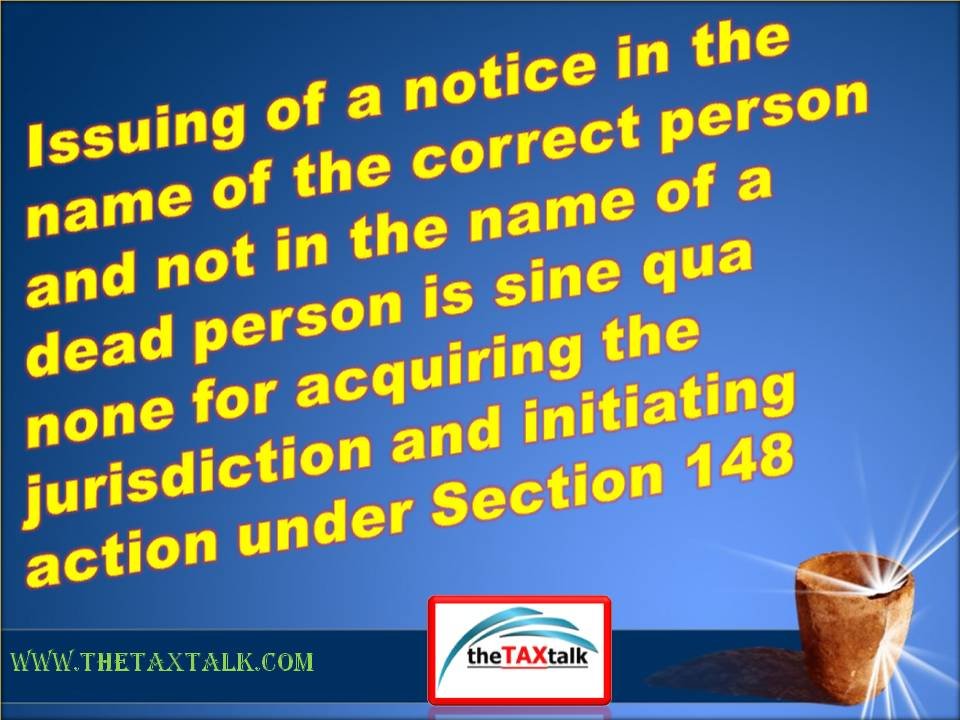![]()
Issuing of a notice in the name of the correct person and not in the name of a dead person is sine qua none for acquiring the jurisdiction and initiating action under Section 148
The Delhi High Court in its recent case was concerned with the validity of notice u/s 148 issued to a deceased assessee for alleged escarpment of income in the form of salary.
The case details is as under:
DELHI HIGH COURT
SH. MEENU GUPTA (LEGAL HEIR OF LATE SH. VIPIN GUPTA)
VERSUS
ASSISTANT COMMISSIONER OF INCOME TAX, CIRCLE 67 (1) , DELHI & ORS. No. –
W. P. (C) 10162/2024 & CM APPL. 41748/2024 (Stay)
Dated.- September 20, 2024
Let us have a shot overview of the case:
The question of the validity of a notice issued against a dead person is no longer res-integra. While dealing with an identical question, this Court in the case of Savita Kapila v. Assistant Commissioner of Income Tax in W.P. (C) No. 3258 of 2020 held that the pre-requisite for issuing a notice in the name of the correct person and not in the name of a dead person is sine qua none for acquiring the jurisdiction and initiating action under Section 148 of the Act.
Recently, in the case of Sangeeta Goyal v. Commissioner of Customs (Exports), WP (C) 13025/2019, while taking note of the decision rendered in Savita Kapila (supra), we took the view that Show Cause Notice having been issued against a dead person cannot be sustained, and consequently, the recovery proceedings initiated pursuant thereto, were quashed.
In the present case, the proceedings were not initiated against the assessee when he was alive and after his death, his legal heirs did not step into the shoes of the deceased assessee.
The Gujarat High Court in Chandresh Jayantibhai Patel v ITO 2018 SCC OnLine Guj. 4812, took the view that there is no statutory provision which casts a duty upon the legal representatives to intimate the factum of death of an assessee to the Income Tax Department. The Court also took note that there may be cases where the legal representatives are estranged from the deceased assessee or the deceased assessee may have bequeathed his entire wealth to a charity.
Hence, on the touchstone of the principles that emerge from the judicial pronouncements discussed above, it is evident that action under Section 147 of the Act cannot be initiated as the impugned notices were issued in the name of a dead person.
Tax liability on salary income:
Since the tax has already been deducted on the salary income, as is evident from Form-16, the reassessment action leading to demand of tax cannot be initiated against the assessee or even his legal representatives. Even on account of non-deposit of TDS by the employer, we had in the case of Shantanu Awasthi v. Income Tax Officer, Ward 61 (1), WP (C) 3518/2023, while relying upon the Office Memorandum of the Central Board of Direct Taxes [“CBDT”] dated 11.03.2016, concluded that there was no justification for the demand being shown as outstanding against the writ petitioner.
Taking note of the above position, we are of the view that the impugned notice under Section 148-A(b) dated 15.02.2024, order under Section 148-A(d) and notice under Section 148, both even dated 21.03.2024 cannot be sustained and are set aside.
The copy of the order is as under:
Sh_Meenu_Gupta_Legal_Heir_Of_Late_Sh_vs_Assistant_Commissioner_Of_Income_Tax_on_20_September_2024

